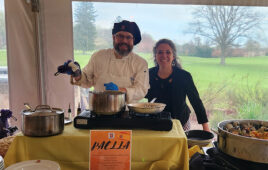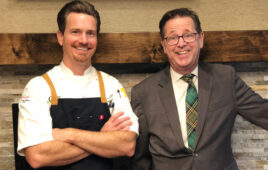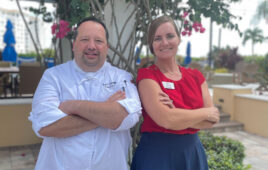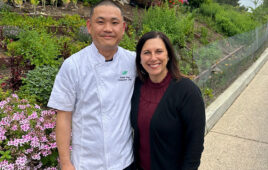Michael Redmond, GM/COO of The Metropolitan Club of the City of Washington, discovered that coming out of the kitchen to become a manager was the best thing for his club, and his career.
It’s never easy to leave the kitchen—especially when you’ve been on the line for nearly two decades. But when the opportunity was presented to Michael Redmond, CEC, CCM, General Manager/COO of The Metropolitan Club of the City of Washington (D.C.), to take on an assistant general manager role, despite having served only as a chef, it was an opportunity he couldn’t pass up.
The transition was difficult, but it has given Redmond—who was tapped in 2012 as a “Rising Star” through the Excellence in Club Management Awards co-sponsored by Club + Resort Business—valuable perspective about what it takes to run a world-class culinary operation, and how important it is to trust your chef.

Michael Redmond, CEC, CCM (right), General Manager
of The Metropolitan Club of the City of Washington (D.C.)
C+RC: Why did you decide to leave the kitchen?
Michael Redmond (MR): After nine seasons in a full-service club, I met Reinhard Danger. He was the General Manager of the Genesee Valley Club (Rochester, N.Y.). Reinhard hired me as his Executive Chef.
After eight years, Reinhard informed me of his move to The Metropolitan Club in Washington and of his desire to take me with him as his Assistant General Manager. I was flattered, but didn’t know much about Washington or the club. The idea of giving up the kitchen was daunting. Having been a chef himself, Reinhard convinced me there would be a lot of opportunities and it would be worth it.
C+RC: You obviously said yes. But do you miss the kitchen?
MR: I miss the kitchen every day, but I do not miss the hours. I miss the
intimate team and controlling
everything in my environment.
C+RC: What was the F&B operation like at The Metropolitan Club when you first came on board?
MR: The club was a beautiful place filled with impressive people, but F&B had fallen flat. There wasn’t any chemistry left.
C+RC: What did you do next?
MR: We interviewed many talented chefs from in and out of our market. And then we hired Vincent Horville as Executive Chef. [Horville] will tell you we didn’t even discuss cooking during his interviews. It’s all about soft skills in a club. Yes, you have to be talented, but if you can’t speak to members, if you can’t feel comfortable in the dining room and cannot nurture and build a team, you’ll never survive in the club industry.
C+RC: What is your relationship like with Chef Horville? And how has it changed or evolved?
MR: The first two years were the hardest for us. There was a lot of work and fine-tuning on both sides of the wall and, let’s face it, my career change presented some challenges.
When we would have tough days, I would retreat to where I was most comfortable—the kitchen. I’m still to this day not sure how [Horville] put up with all of my input and time spent in there.
Reinhard Danger was incredibly patient and explained to me more times than I can count that if I continually stayed in the kitchen, no one would want to work for me. And that was true.
[Chef Horville] and I eventually learned how to trust one another, and I pulled back from interjecting myself in the chef’s role.
Since then we have grown together with mutual respect. And he has really done a great job for the club over the last 12 years. He possesses all the traits of a truly great club chef.
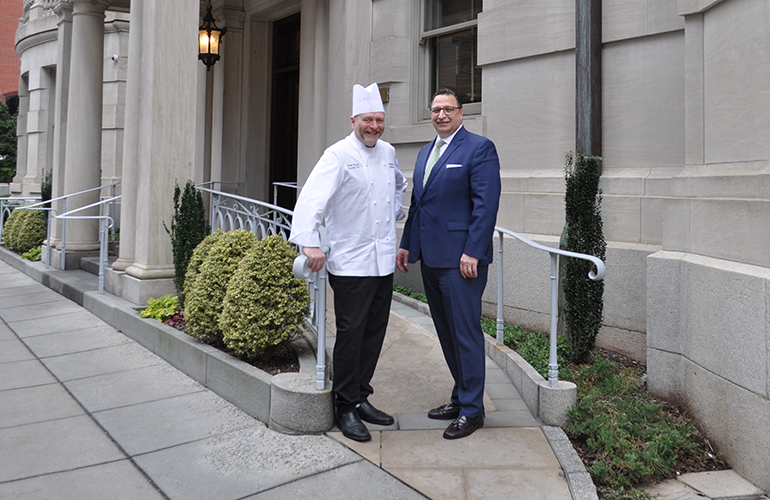
Michael Redmond, CEC, CCM (right), General Manager
of The Metropolitan Club of the City of Washington (D.C.) with Executive Chef Vincent Horville.
C+RC: What do you value most in Chef Horville?
MR: He is a leader and he can be counted on to handle his piece of the puzzle. He is also an incredible problem solver. I always say to my senior management team that if I found myself in a canoe without paddles, I would want [Horville] in it with me.
C+RC: How does your experience as a chef help you as a GM/COO?
MR: Having spent more than half of my life in the kitchen, I can help understand and promote the overall vision while also helping to build and develop the team.
C+RC: What should a club manager’s role be in the F&B department?
MR: The General Manager should be supportive and guide the team while communicating the overall direction and desires of the membership. Then we must let the team develop. I believe you hire “thoroughbred race horses” and let them run. If you, as the manager, have really done your job—meaning you have recruited the right team—you should let them take care of business.
C+RC: What kinds of people thrive on your club’s F&B team?
MR: Happy, self-driven professionals at all levels. We can teach a lot of things, but we can’t teach drive, and I can’t force a smile.
C+RC: What drives F&B success?
MR: We measure success by engagement, and not solely by the P&L. The F&B operation is an amenity within the club that plays a major role in member retention. To achieve the engagement levels we want, it’s imperative to have enthusiastic, creative, well-trained individuals on your team.
C+RC: How has the industry’s focus on F&B evolved?
MR: It’s an exciting time to be an F&B professional. Who would have thought 20 years ago that a club would need a mixologist, a sommelier and a sushi chef? C+RC
The downside of this is that the hospitality industry is growing so quickly, the employable talent pool is shrinking. Executive Chefs in the club industry are really challenged to find staff. The front of the house is equally challenged, so we always need to be interviewing and recruiting.
C+RC: If you could tell club chefs one thing about club management, what would it be?
MR:It can’t be all about you! A great club chef realizes that and focuses on building and training his or her culinary team. He or she focuses on the membership and what members desire.
Extra questions if there is room or for online only:
C+RC: What have been some of The Metropolitan Club’s F&B goals over the years? And how have you achieved them?
MR: For the F&B team the goal was, and still is, to build trust and first-class experiences for our membership and to never become complacent. The goal is very similar to most clubs’ goals and that is to innovate, create, and execute first-class service and products that create membership engagement.
When I arrived in 2007, we offered six club events a month. Today we have grown that to from 18 to 22 per month. When I arrived we were primarily a lunch club serving on average 200 covers throughout all outlets. À la carte dinner averaged 12 covers. Today, our programming is off the charts, and the dining room—led by our world-class maître ‘d, Alessandro Monzi—averages 60 to 70 covers a night.
The other challenge we faced was that we had a wine inventory of $1.3 million (19,000 bottles), and no one seemed to be drinking much of it. Today we have a world-class wine program, led by our wine committee. We employ two sommeliers and have implemented a pricing strategy that is very favorable for the membership.
No matter what the club’s challenge is, it takes focus and synergy from everyone on the team to make it happen.
C+RC: What have been some of the most significant F&B improvements at The Metropolitan Club?
MR: Since 2007 we have been able to invest $27 million in capital. The most impactful capital projects have been creating a world-class wine cellar/storage facility for both list and futures and, of course, our main kitchen renovation. We have also continually invested in member spaces, which has helped drive new revenue.
C+RC: What is next for F&B at The Metropolitan Club of the City of Washington?
MR:- We are currently working on a rooftop venue with a plan to bring back cigar smoking, craft cocktails and the culinary team’s charcuterie offerings (and, of course, the occasional BBQ).
C+RC: What is your management style?
MR: Direct! I like to believe everyone on the team knows what the expectations are and where they stand within the organization. I believe this is critical for us to continue to grow our success.

